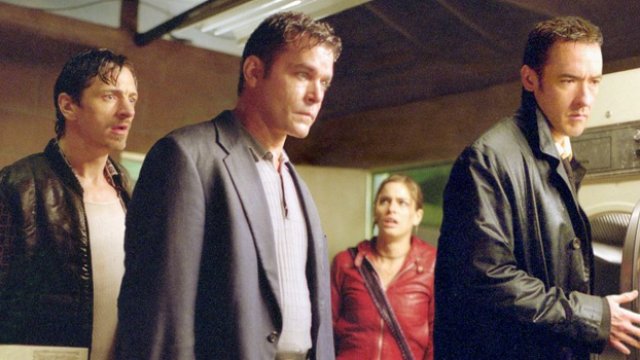For years, James Mangold’s has been my go-to example for a film where the premise is vastly better than the execution. That’s still true, but I was disconcerted to rewatch it recently and find that, despite its numerous faults, I almost liked it. (Who am I?) I’d even go so far as to say its problem is less its execution than its budget. This should be a B-movie made on a shoestring budget. It can keep its surprisingly strong cast–John Cusack, Ray Liotta, Amanda Peet, Alfred Molina, John Hawkes, John C. McGinley, Pruitt Taylor Vince, Clea DuVall–but it needs to lose its polish. The money behind it is choking the life out of it.
A torrential storm sends travelers scurrying to shelter at a cheap roadside motel. Everyone has approximately one character trait, to help you remember them; cliché back-story is doled out in chunks of helpful exposition. There’s a Good Man with a Tragic Past, a Hooker with a Heart of Gold, a Mild-Mannered Rule-Follower, a Bitchy Has-Been, a pair of Ill-Advised Newlyweds (including an Unreliable Young Man and a Woman Who Faked a Pregnancy), and so on. There are roughly two built-in surprises in terms of who’s who, and both are ultimately fairly predictable; the best and most genuine bit of characterization comes when John Cusack’s cop-turned-chauffeur reminisces about why he left the force, and it’s a reason that’s just a little stranger and darker than you might expect.
The movie soon veers into slasher territory, as the motel guests start dying off in varied ways, with the motel room keys being used to number their deaths in a sinister countdown. A straightforward treatment of this would actually be more interesting to me than the high-concept “this is all happening for a reason” plot we get, but this time around, I have to admit that Identity at least handles its first big revelation with gratifying swiftness. The movie’s overall structure is baggy, but this bit is nicely paced: when the characters notice that what they’re seeing defies logic, the film doesn’t force them to aimlessly tread water for too long. It moves rapidly on to what’s really happening, and it–unusually for this kind of movie–invests this second setup with actual stakes. It may not be handled well enough to give you any actual emotional investment, but you can at least see how the events unfolding have weight.
Identity certainly fails Howard Hawks’s test of having three good scenes and no bad ones; I’d put it at maybe one good scene and numerous bad ones. But it still has enough deftness to it that you can see how Mangold would go on to do significantly better work: tons of rain-soaked atmosphere, a handful of effective dramatic and comedic beats, great casting, and a haunting use of Hughes Mearns’s “Antigonish.” (Hey, if you can’t make your own artisanal creepiness, it’s fine to use the store-bought kind.) This still ultimately feels like a writing exercise–take the basic situation, give it to a handful of people, and see what divergent takes they come up with–but its long war of attrition against me is clearly starting to have results.
Identity is streaming on Netflix.

